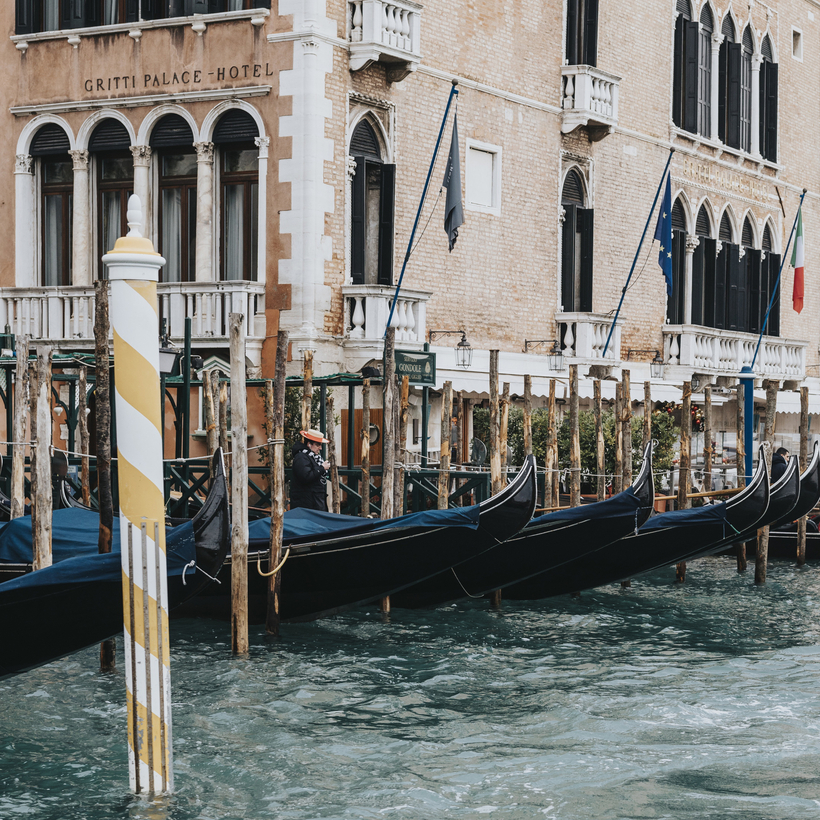The Gritti. Try saying it without rolling your r’s or breathing a sigh. The most glamorous and storied hotel in Venice stands sentinel across the Grand Canal from Santa Maria della Salute, the Baroque basilica immortalized in chalky hues by Sargent, Turner, and untold holiday painters.

Built for a 15th-century nobleman and named for a 16th-century doge, the Gritti was converted into a hotel in the 19th century and into the hotel in 1947 by the Compagnia Italiana Grandi Alberghi group.
The beau monde arrived in droves to sign the visitor’s fabled “golden book”: Garbo and Chaplin, Igor Stravinsky, the Duke and Duchess of Windsor, and even Liberace, who drew a perfect piano topped by a candelabra. One page, dated September 3, 1967, bears the signatures of Prince Rainier and Princess Grace of Monaco, followed by those of Elizabeth Taylor and Richard Burton, who were in Venice to attend a fundraising party at Palazzo Rezzonico. Burton went dressed as a cardinal, and Taylor borrowed a costume from the film she was currently working on, Boom!


Writers loved the Gritti. Somerset Maugham memorably noted that there were “few things in life more pleasant” than sitting on its terrace at sundown. Hemingway wrote passages of Across the River and into the Trees there, and true to the idea that you can’t drink all day without starting in the morning, he was known to consume three bottles of Valpolicella “first thing,” according to his biographer Anthony Burgess.


Both Maugham and Hemingway have suites named after them on the piano nobile. Hemingway’s is decorated in a watery green and gold with rococo flourishes; Maugham’s is in cassata colors that might have appealed to his former wife, the interior designer Syrie Maugham.
For Venetians, the only quiet time of the year happens between New Year’s and Carnival, in February, and so they head to the sun. But during a dank January, I stayed there for several days while Rupert Everett was billeted in the Hemingway suite, writing his weepingly funny short story “Keiran O’Nightley, off-season queen,” detailing the adventures of his “long-toothed matinee idol” alter ego.
Somerset Maugham memorably noted that “there were few things in life more pleasant” than its terrace at sundown.
But as the Gritti entered the 21st century, her allure was fading. High-spending guests looked askance at shower curtains and pondered the eccentric wiring. But panic spread among devotees like the unnamed epidemic in Thomas Mann’s Death in Venice when a restoration was proposed.

The hotel closed in 2011 and reopened in 2013 after a $50 million face-lift. Like all great face-lifts, it was a sleight of hand. The Gritti appeared lighter, brighter, and more dazzling than before. Her bones showed through. (Was she in love?) American interior designer Chuck Chewning took charge, conjuring up a fantasy in Rubelli fabrics, Murano glass, antique furniture, and floral arrangements like fireworks displays. It was theatrical, and somehow discreet. Homely, if home is a 15th-century palace.
And the beau monde returned. Venice’s Biennale and the film festival (so much more stylish than Cannes) ensure that a cast both starry and cool gather on the Gritti’s terrace at key points in the year: Tom Cruise and Tom Ford, Julian Schnabel and Scarlett Johansson.


“Only 200 people a night go out in Venice,” notes the Gritti’s elegant and effusive manager, Paolo Lorenzoni, who gives the strong impression of knowing 198 of them. And on any given night, a number will drop by for a spritz, reclaiming the view (though the Salute is currently undergoing a renovation behind a giant ad for Kiko cosmetics) and keeping pigeons at bay with branded Gritti water pistols.

I once fell into conversation with a couple who asked me to their nearby palazzo the following evening for cocktails. The first martini was thrown into the canal for the fish.
Hotels are habit-forming. But some get under your skin, into your heart. More than the thread count, the spa, or the Michelin star—all can be bought or earned—luxury is atmosphere, the smile in the mind, the quickening pulse. Luxury is love.
David Downton is an Editor at Large for AIR MAIL


